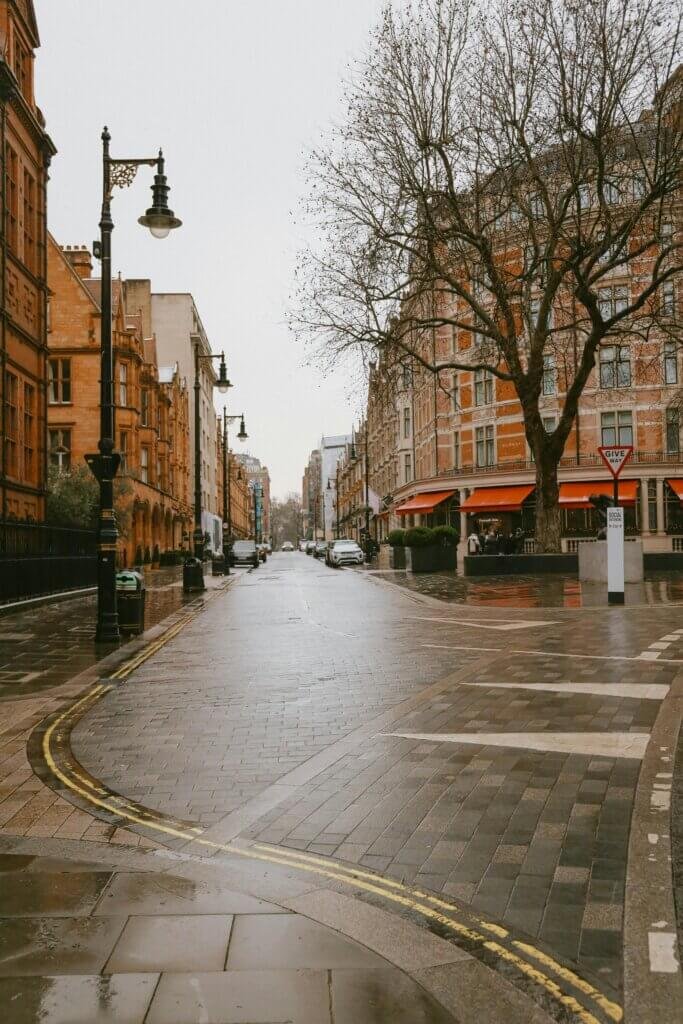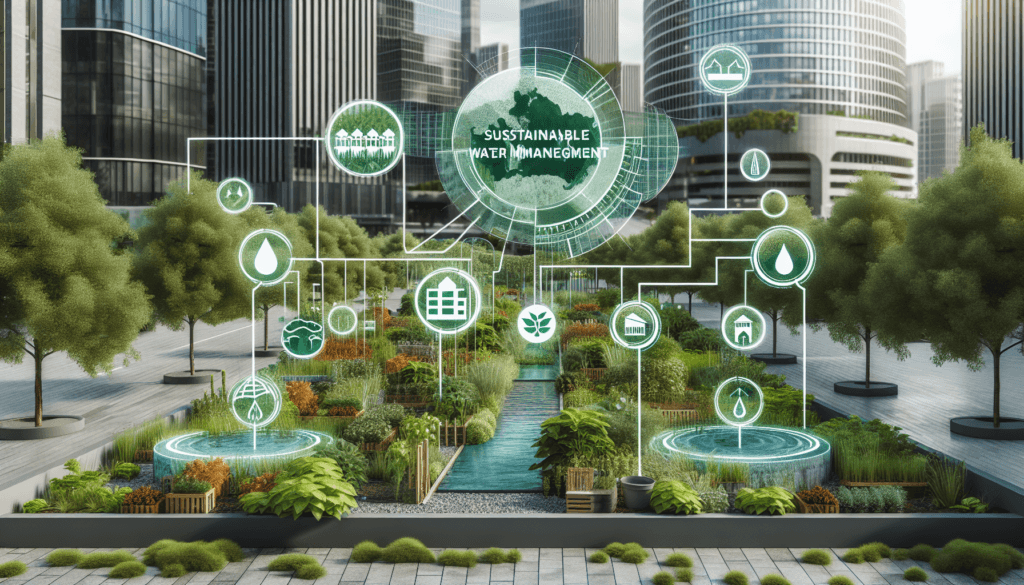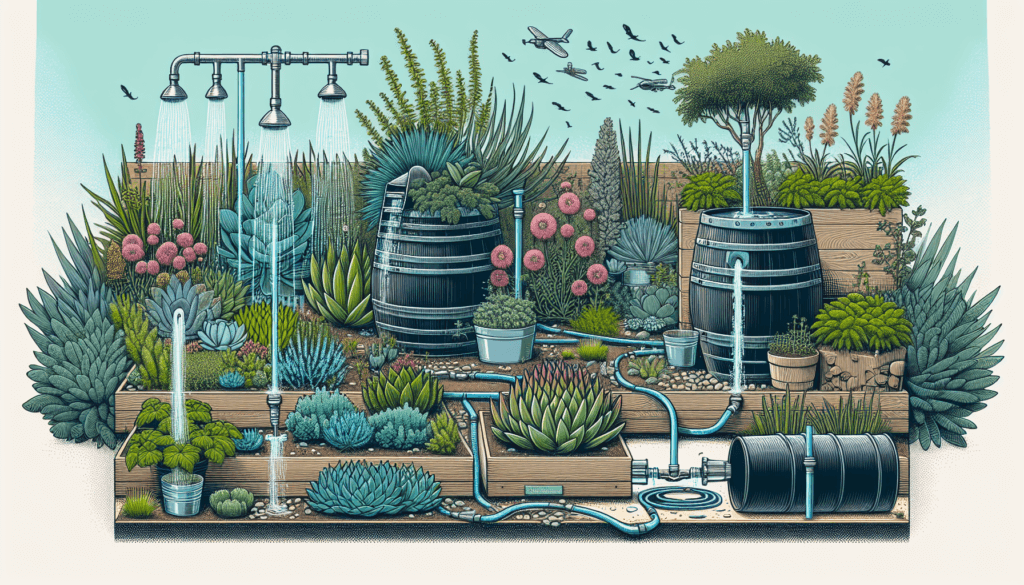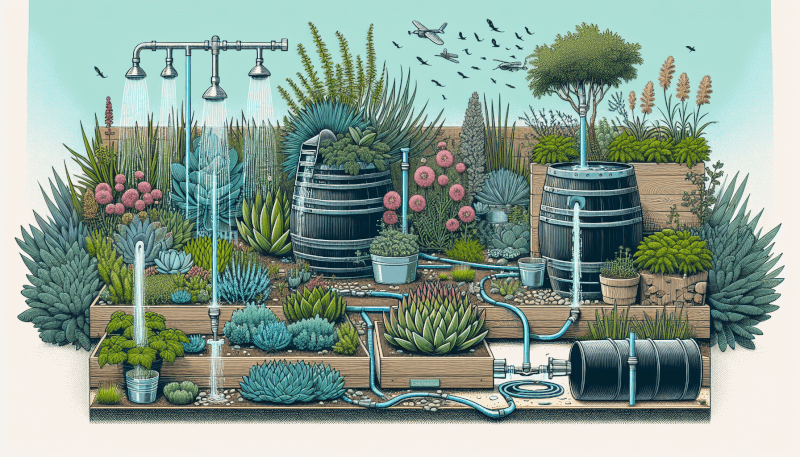Are you interested in urban gardening? If so, then you’ll be thrilled to learn about these tips for creating a sustainable water management system. As cities continue to grow, finding effective ways to conserve and manage water in urban gardens becomes increasingly important. From using rain barrels to implementing drip irrigation systems, this article will provide you with practical and easy-to-follow tips for maximizing water efficiency in your urban garden. So, grab your gardening gloves and get ready to make a positive impact on both your plants and the environment with these urban gardening tips.

Choosing the right plant varieties
Choosing the right plant varieties is essential for creating a sustainable water management system in your urban garden. One of the key factors to consider when selecting plants is their water requirements. Different plants have different water needs, so it is important to choose varieties that are well-suited to your local climate.
Consider water requirements
When choosing plants for your garden, consider their water requirements. Some plants, such as succulents, have low water requirements and can tolerate dry conditions, making them ideal for water-conscious gardening. On the other hand, certain plants, like ferns, require more water to thrive. By selecting plants with similar water needs, you can ensure efficient water usage in your garden.
Select drought-tolerant plants
Another factor to consider when choosing plant varieties is their drought-tolerance. Drought-tolerant plants are able to survive and thrive with less water, making them perfect for water-conscious gardening in urban areas. Look for plants that have adapted to your region’s climate and can withstand long periods of dry weather. These plants will require less watering and help conserve water in your garden.
Opt for native species
Choosing native plant species is not only beneficial for the environment but also for water conservation. Native plants are well-adapted to the local climate, which means they require less water and are more resilient to drought conditions. Additionally, native plants provide important food and habitat for local wildlife, making them an excellent choice for creating a sustainable urban garden.
Mulching and soil preparation
Mulching and soil preparation play a crucial role in a sustainable water management system for your urban garden. By employing these techniques, you can conserve moisture, improve soil structure, and enhance drainage.
Mulch to conserve moisture
Mulching is one of the most effective ways to conserve moisture in your garden. By applying a layer of organic mulch, such as wood chips or straw, around your plants, you can prevent water evaporation from the soil surface. Mulch also acts as an insulator, protecting plant roots from extreme temperatures. Additionally, mulch helps suppress weed growth, reducing competition for water and nutrients.
Improve soil structure and drainage
Preparing your soil properly is essential for optimal water management in your urban garden. Amending your soil with organic matter, such as compost or aged manure, can improve its structure and drainage. Well-draining soil allows excess water to flow away, preventing waterlogging and root rot. By improving soil structure, you create an environment that retains moisture while allowing excess water to pass through.
Add organic matter
Incorporating organic matter into your soil is beneficial for both water retention and plant health. Organic matter helps increase the soil’s ability to hold water, reducing the need for frequent watering. It also improves soil structure and fertility, providing a rich environment for plant growth. Adding compost or other organic materials to your soil is an excellent way to increase its water-holding capacity and promote overall garden sustainability.

Watering techniques
Proper watering techniques are essential for maintaining a sustainable water management system in your urban garden. By using drip irrigation, avoiding overwatering, and watering during the early morning or late evening, you can ensure efficient water usage and promote plant health.
Use drip irrigation
Drip irrigation is a highly efficient watering technique that delivers water directly to the roots of plants. By using a series of tubes with small holes near the base of plants, drip irrigation minimizes water loss through evaporation and runoff. This method also allows you to control the amount of water each plant receives, ensuring that water is used efficiently throughout your garden.
Avoid overwatering
Overwatering is a common mistake that can lead to water waste and plant health issues. By avoiding overwatering, you not only conserve water but also promote healthier plant growth. Before watering, check the moisture level of the soil using a finger or a moisture meter. Only water when the soil feels dry to the touch. Remember, it is better to underwater than overwater, as most plants can tolerate temporary drought conditions.
Water during the early morning or late evening
When it comes to timing your watering sessions, it is best to water during the early morning or late evening. At these times, temperatures are cooler, and there is less risk of water evaporation. Watering when the sun is not at its peak also reduces the risk of leaf scorch and fungal diseases. Additionally, watering in the morning allows the plant leaves to dry before evening, preventing prolonged moisture on the foliage, which can lead to disease.
Rainwater harvesting
Rainwater harvesting is an excellent way to supplement your water supply and reduce reliance on external sources. By installing rain barrels or cisterns, directing downspouts to garden areas, and creating rain gardens, you can make the most of natural rainfall and conserve water.
Install rain barrels or cisterns
Installing rain barrels or cisterns is a simple yet effective way to collect and store rainwater. Place these containers under downspouts or gutters to capture the rainfall from your roof. The collected water can then be used for watering your garden, reducing the need for tap water. Be sure to cover the containers to prevent mosquito breeding and filter the water before using it on edible plants.
Direct downspouts to garden areas
Directing downspouts to garden areas is another method of harvesting rainwater. Instead of allowing rainwater to flow into storm drains, redirect it towards specific areas in your garden. By using downspout extensions, you can channel the water directly to plants, where it can be absorbed into the soil. This technique not only conserves water but also prevents runoff and erosion.
Create rain gardens
Rain gardens are specially designed to capture and utilize rainwater runoff. These gardens are planted in shallow depressions, allowing rainwater to collect and slowly percolate into the soil. By incorporating native plants and using a mix of well-draining soil and compost, rain gardens can effectively manage stormwater runoff and conserve water. Additionally, rain gardens provide habitat for wildlife and add visual interest to your urban garden.

Greywater recycling
Greywater recycling is an innovative way to repurpose household wastewater and reduce water waste. By collecting and reusing greywater, using eco-friendly soaps and detergents, and regularly inspecting and maintaining greywater systems, you can significantly reduce water consumption in your urban garden.
Collect and reuse household greywater
Greywater refers to water from sinks, showers, and laundry that can be reused for purposes other than drinking. Collecting and reusing greywater in your garden is a sustainable way to conserve water. Simple methods, such as using a bucket to collect shower water or diverting laundry water to irrigate plants, can make a significant difference in water usage. However, it is crucial to use non-toxic cleaning products and avoid water contaminated with chemicals or fecal matter.
Use eco-friendly soaps and detergents
When using greywater in your garden, it is important to use eco-friendly soaps and detergents. Traditional cleaning products may contain harmful chemicals that can negatively impact plant and soil health. Look for biodegradable and phosphate-free products that are safe for plants and the environment. By using eco-friendly cleaning products, you can ensure that the greywater you use in your garden is not harmful to your plants or the ecosystem.
Inspect and maintain greywater systems
Regular inspection and maintenance of greywater systems are essential to ensure their efficient operation. Check pipes, filters, and distribution lines for any leaks or blockages and promptly address any issues. Proper maintenance of your greywater system will not only prevent water wastage but also prolong its lifespan. Additionally, regularly monitoring the quality of the greywater used in your garden is crucial to avoid any potential health risks.
Managing runoff and stormwater
Managing runoff and stormwater is an integral part of a sustainable water management system in your urban garden. By redirecting runoff to garden beds, creating bioswales or infiltration trenches, and installing permeable surfaces, you can minimize water runoff and promote water conservation.
Redirect runoff to garden beds
Instead of allowing rainwater to flow off your property into storm drains, redirecting runoff to garden beds can help maximize water absorption. By creating swales or channels, you can direct runoff towards your garden, where it can infiltrate the soil. This technique not only reduces water runoff but also maintains the natural water cycle and prevents erosion.
Create bioswales or infiltration trenches
Bioswales or infiltration trenches are designed to capture and filter stormwater runoff. These shallow, landscaped channels are filled with gravel, permeable soil, and water-loving plants. As runoff flows through the bioswales or trenches, pollutants are filtered out, and water is slowly absorbed into the ground. This process not only reduces the burden on storm drains but also helps recharge groundwater and supports plant growth.
Install permeable surfaces
Replacing impermeable surfaces, such as concrete or asphalt, with permeable surfaces is an effective way to manage stormwater runoff. Permeable surfaces, such as porous pavers or gravel pathways, allow water to infiltrate the ground instead of running off. This reduces the amount of water that enters storm drains and helps replenish groundwater. Additionally, permeable surfaces can enhance the aesthetic appeal of your urban garden while promoting sustainability.

Effective irrigation techniques
Effective irrigation techniques are essential for optimal water management in your urban garden. By using soaker hoses or drip lines, grouping plants with similar water needs, and monitoring soil moisture levels, you can ensure water efficiency and promote plant health.
Use soaker hoses or drip lines
Soaker hoses or drip lines are excellent alternatives to traditional sprinkler systems, as they minimize water waste and deliver water directly to the roots of plants. These systems allow water to slowly seep out along the length of the hose or line, providing a deep soak for plants. By placing the hoses or lines near the base of plants, you can ensure that water reaches the root zone and is not lost to evaporation or runoff.
Group plants with similar water needs
Grouping plants with similar water needs is a practical way to optimize irrigation in your urban garden. By creating irrigation zones based on water requirements, you can tailor your watering schedule to meet the specific needs of different plant groups. For example, grouping drought-tolerant plants together and watering them less frequently can help conserve water. Similarly, grouping water-loving plants together can ensure they receive adequate moisture without overwatering other plants.
Monitor soil moisture levels
Monitoring soil moisture levels is crucial for effective irrigation. By regularly checking the moisture level of the soil, you can avoid under- or overwatering your plants. Use a moisture meter or simply insert your finger into the soil to assess its moisture content. If the soil feels dry, it is time to water. On the other hand, if the soil feels moist, it is best to hold off watering until the soil dries out a bit. Monitoring soil moisture allows you to adjust your watering schedule accordingly and prevent water waste.
Composting and nutrient recycling
Composting and nutrient recycling are essential components of a sustainable water management system in your urban garden. By utilizing kitchen scraps for composting, applying compost to improve soil water retention, and considering vermicomposting, you can reduce waste, enhance soil health, and conserve water.
Utilize kitchen scraps for composting
Composting kitchen scraps is an excellent way to reduce waste and create nutrient-rich compost for your garden. Instead of throwing away fruit and vegetable peels, coffee grounds, and eggshells, collect them in a compost bin or pile. These organic materials will break down over time and turn into nutrient-rich compost that can be incorporated into your soil. Compost improves soil structure, enhances moisture retention, and promotes healthy plant growth.
Apply compost to improve soil water retention
Applying compost to your soil is a simple yet effective way to improve its water retention capacity. Compost acts as a sponge, absorbing and holding moisture in the soil. By amending your soil with compost, you create an environment that retains water more effectively, reducing the need for frequent watering. Additionally, compost enriches the soil with essential nutrients, promoting overall plant health and reducing water stress.
Consider vermicomposting
Vermicomposting, or composting with worms, is a fantastic way to recycle kitchen scraps and create nutrient-rich compost. The worms feed on organic materials, breaking them down into castings, also known as worm poop. These castings are highly beneficial for plant growth, as they improve soil structure, increase water retention, and provide essential nutrients. Setting up a vermicomposting bin in your urban garden is relatively simple and can contribute to a more sustainable water management system.

Smart water usage practices
Smart water usage practices are key to maintaining a sustainable water management system in your urban garden. By capturing and reusing household water, avoiding water wastage during maintenance, and implementing smart irrigation systems, you can conserve water and create a more sustainable gardening environment.
Capture and reuse household water
Capturing and reusing household water is an effective way to reduce water waste and supplement your garden’s water supply. Simple methods, such as collecting water from washing fruits and vegetables or using a bucket to collect shower water, can make a significant difference. This reclaimed water can then be used for watering plants, reducing the demand for tap water. Be mindful of using non-potable water for edible crops and ensure proper filtration when necessary.
Avoid water wastage during maintenance
Water wastage during garden maintenance is a common issue that can be easily avoided. When cleaning walkways or patios, use brooms instead of hosepipes to remove debris. Check for leaks in hoses, sprinklers, and irrigation systems regularly and repair them promptly. Additionally, avoid using excessive amounts of water when pressure washing or cleaning outdoor surfaces. By being mindful of water usage during maintenance, you can minimize water waste and contribute to a sustainable water management system.
Implement smart irrigation systems
Smart irrigation systems provide efficient and automated watering solutions for your urban garden. These systems use weather-based sensors or timers to adjust watering schedules and minimize water waste. Some smart systems also connect with local weather forecasts, adjusting irrigation based on current and predicted rainfall. By implementing a smart irrigation system, you can ensure that your garden receives the right amount of water at the right time, conserving water and promoting plant health.
Monitoring and conservation
Monitoring water usage and implementing conservation measures are essential for maintaining a sustainable water management system in your urban garden. By regularly assessing water usage, implementing conservation measures, and monitoring plant health and stress levels, you can make informed decisions and promote long-term sustainability.
Regularly assess water usage
Regularly assessing water usage in your urban garden allows you to identify areas where improvements can be made. Keep track of how much water you use for irrigation and compare it to the water needs of your plants. By understanding your water usage patterns, you can make adjustments to optimize water efficiency. Consider using water meters or tracking tools to monitor and evaluate your garden’s water consumption.
Implement conservation measures
Implementing conservation measures is vital for reducing water waste and promoting sustainability. Consider installing water-efficient fixtures, such as low-flow toilets and aerated faucets, in your home. Implement rainwater harvesting techniques, such as installing rain barrels or cisterns, to supplement your garden’s water supply. Encourage water-conscious habits, such as shorter showers and turning off the tap when brushing your teeth. By adopting these conservation measures, you can significantly reduce water consumption and contribute to a sustainable water management system.
Monitor plant health and stress levels
Monitoring plant health and stress levels is crucial for identifying water-related issues in your urban garden. Look for signs of overwatering or underwatering, such as wilting, yellowing leaves, or stunted growth. Adjust your watering schedule accordingly to ensure your plants receive the right amount of water. Additionally, observe the overall health and vigor of your plants to assess the effectiveness of your water management system. Healthy plants are more resilient to water stress and require less water to thrive.
By following these urban gardening tips and creating a sustainable water management system, you can enjoy a thriving garden while conserving water and promoting environmental sustainability. Remember to choose the right plant varieties, employ mulching and soil preparation techniques, utilize effective watering techniques, implement rainwater harvesting and greywater recycling systems, manage runoff and stormwater, apply composting and nutrient recycling practices, practice smart water usage, and regularly monitor and conserve water. With these comprehensive strategies in place, you can create an urban garden that thrives with minimal water usage and contributes to a more sustainable future.

